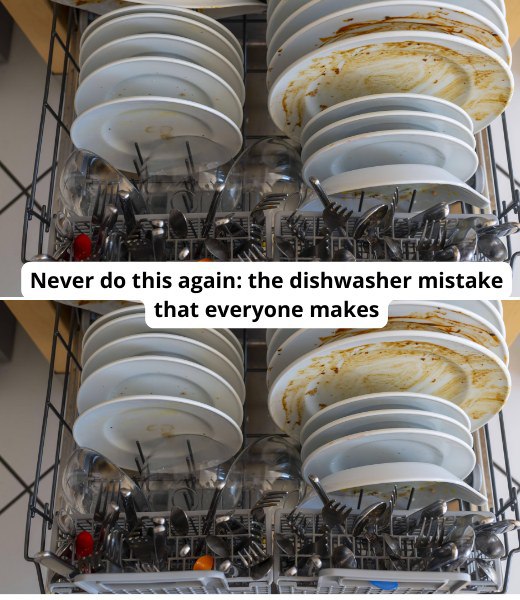ADVERTISEMENT
Never Do This Again: The Dishwasher Mistake That Everyone Makes
Dishwashers are undoubtedly one of the most useful kitchen appliances, saving time and effort when it comes to cleaning dishes. However, even with the convenience of a dishwasher, many people make simple yet significant mistakes that can impact the cleaning efficiency and longevity of both the machine and the dishes.
One of the most common dishwasher mistakes that people make is improperly loading the dishwasher. You might think that as long as you fill the dishwasher and close the door, everything will be clean and tidy. Unfortunately, that’s not always the case. In fact, improperly loading your dishwasher can prevent your dishes from getting fully clean, damage the machine, and even result in the buildup of food particles or unpleasant odors.
The Mistake: Overloading the Dishwasher
We’ve all done it—stuffing the dishwasher with as many dishes as possible, hoping to get everything clean in one go. But, overloading your dishwasher is one of the most common mistakes people make, and it leads to several problems. Here’s why overloading your dishwasher can have negative consequences:
🚫 Why You Should Never Overload Your Dishwasher:
- Incomplete Cleaning: When you cram too many dishes into the dishwasher, the water and detergent struggle to reach every surface. Items that are placed too close together or overlapping may not get cleaned properly, leaving them with food residue or soap buildup.
- Damage to the Dishwasher: Overloading your dishwasher places unnecessary strain on the appliance. The spray arms may become obstructed, preventing them from rotating properly and distributing water evenly. Over time, this can lead to wear and tear on the dishwasher’s components.
- Water Drainage Issues: When there are too many dishes in the dishwasher, water can have difficulty draining completely. This can result in stagnant water pooling at the bottom, leading to unpleasant smells and the possibility of mold or mildew growth.
- Dish Damage: Overloading also increases the chances of dishes being damaged. Fragile items like glasses, plates, or bowls may get chipped, scratched, or cracked if they bump into each other or the interior of the dishwasher.
✅ How to Properly Load Your Dishwasher:
To avoid these common issues, it’s essential to load your dishwasher correctly. Follow these tips to ensure your dishes come out sparkling clean every time:
- Avoid Overcrowding: Only load as many dishes as can fit comfortably in your dishwasher without overcrowding. Each dish needs space for water and detergent to circulate freely. If necessary, wash dishes in multiple loads.
- Top Rack for Fragile Items: Place glasses, cups, and small bowls on the top rack. This area is gentler on delicate items and allows for a more even cleaning. Be sure to position glasses upside down to avoid water pooling inside.
- Bottom Rack for Larger Dishes: Place larger items, such as plates and pots, on the bottom rack. Angle them so that water can easily reach the surfaces. Avoid nesting dishes, as this can prevent proper water circulation.
